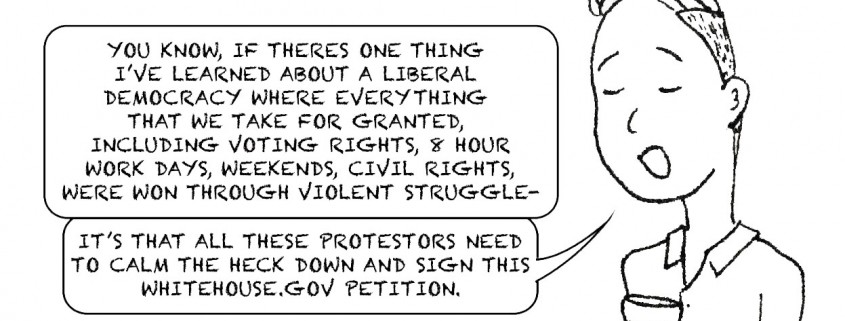University students must reevaluate how they protest Donald Trump
Earlier this month at the “Immigrants Make America Great” march, protesters joined together in chanting “Not My President” for another round of demonstrations. However, the event remains overshadowed by what happened last month when protesters at UC Berkeley prevented a speaking engagement by right-wing commentator Milo Yiannopoulos, known for identifying African Americans as “apes,” comparing feminism to “cancer” and formerly endorsing pedophilia.
On Inaugration Day, many purportedly anti-Trump rioters, who, according to some reports, were merely anarchists with no political affiliation, blocked roads, threw bricks, smashed car windows, and set a Muslim man’s limousine on fire and damaged stores.
Bearing in mind the lack of rationality in these actions, compare these protesters with those from the Women’s March on Jan. 21, which was civil and orderly. While the former portrays an emotional overreaction targeted toward one man, the latter demonstrates a rational response to injustice.
One group allowed their outrage to get the best of them while the other made a careful effort to be peaceful. Should a time for protesting come to USC, there is a better way to assemble — one that won’t be nearly as embarrassing as some of the violent protests that have taken place so far.
An allegory may help to define what rational and emotional responses are: the USC versus UCLA rivalry. Every time the Trojans defeat the Bruins — which is gloriously often — it adds to the personal patriotism of students here. But in searching for the main reason why this mostly lighthearted school rivalry exists, there is no clear rational explanation. It’s an emotional response to feel good every time cardinal and gold shirts take the football field, to feel extra displeasure when a car with a UCLA license plate frame rudely changes lanes without signaling.
Ultimately, there is no rational reason to dislike the school across town, given the fact that UCLA is simply an excellent school. The side that mocks the other better or cheers louder isn’t going to result in higher rankings in U.S. News and World Report. The emotional display of competition between USC and UCLA is all in good fun.
But at some point, many Trump supporters and anti-Trump demonstrators breached the invisible line of civility that protected the sanctity of the right to assemble. UC Berkeley’s Daily Californian published a letter to the editor recently that makes an excellent point: “It’s a cop-out to blame deplorables for Trump and not realize that we are all part of a society that relies on the oppression of the weakest for the relative comfort of others.”
But those who don’t realize this decide on alternative, emotional methods of assembling — the violent protest. By doing so, those who claim to be progressives and “fighting for equality” do a disservice to the respectable platform of the Democratic Party. Protests shouldn’t be raging overreactions to a single individual and descend into chaos. That’s not a protest. Whenever any group breaks the sacred line between lawful assembly and inexcusable rioting, they disrespect everyone who stands for a free society.
For USC students who had no further thoughts on the election other than frustration and anger, don’t let emotions overcome your rational sense of being. The emotional side of a liberal may want to call every Trump supporter an idiot. The rational side would say to trust in the interlocking system of federalism and remain calm. Emotions may guide someone to throw bricks at windows in resentment of the inauguration. Rational thinking says that those are innocent businesses that had nothing to do with the election.
The ultimate realization for all Trojans should be that they are members of academia. They are the guardians of civil society — albeit guardians-in-training. They will be depended upon to cultivate their own enlightened minds so that even when society throws the most difficult responsibilities at them, good outcomes can be expected. This can only happen when we are wise and rational.

